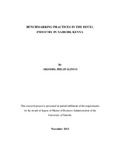| dc.description.abstract | The hospitality industry is served by a variety of service organizations that need to continuously monitor the quality of services offered through various quality improvement tools, including benchmarking. This study sought to establish the extent of application of benchmarking in hotels in Nairobi, Kenya; and to determine the process metrics used in the hotel industry in Kenya. The study was conducted through a cross-sectional statistical survey in which 20 out of 30 targeted hotels returned the completed questionnaire, representing response rate of 66.67.67 per cent. The data was analysed to generate descriptive statistics presented in pie charts, frequency tables, means and correlation matrices. The study found that the majority of the hotels surveyed were aware of, and applied benchmarking in their operations. Among other perceptions, the hotels considered benchmarking to be a useful way to assess hotel performance; a means to share knowledge and enhance the quality of services. The study determined in order of importance, the various reasons that motivate hotels to adopt benchmarking as well as the benefits they hoped to gain from implementing benchmarking in their operations. The reasons considered most important were effectiveness of benchmarking in quality enhancement; helping to provide better services to guests; and maintain competitive advantage. The study identified the barriers to implementing benchmarking in hotels, with confidentiality of information being cited as the most significant. The study determined process metrics used as a basis for comparing a hotel’s services with other establishments in Guest Room values, Front Office services, and Food and Beverage operations. The most important factors in guest room values were: cleanliness of the room, quietness of the room, comfort of the bed/pillow and atmosphere. In front office services, the factors considered most important were: courtesy of employees; reasonable room rates; and promptness of check-in and check-out; while in food and beverage operations, courtesy of employees; speed of service; variety/quality of food and beverages offered; and promptness of seating allocation were the most important. The study encountered some limitations in terms of methods and instrument of data collection; lack of cooperation from respondents; and absence of an up-to-date official list of classified hotels by the Kenya Hotels and Restaurants Authority. This study recommends further research on a wider scope on application of specific types of benchmarking, such as competitive benchmarking in the hotel industry in Kenya. | en |

